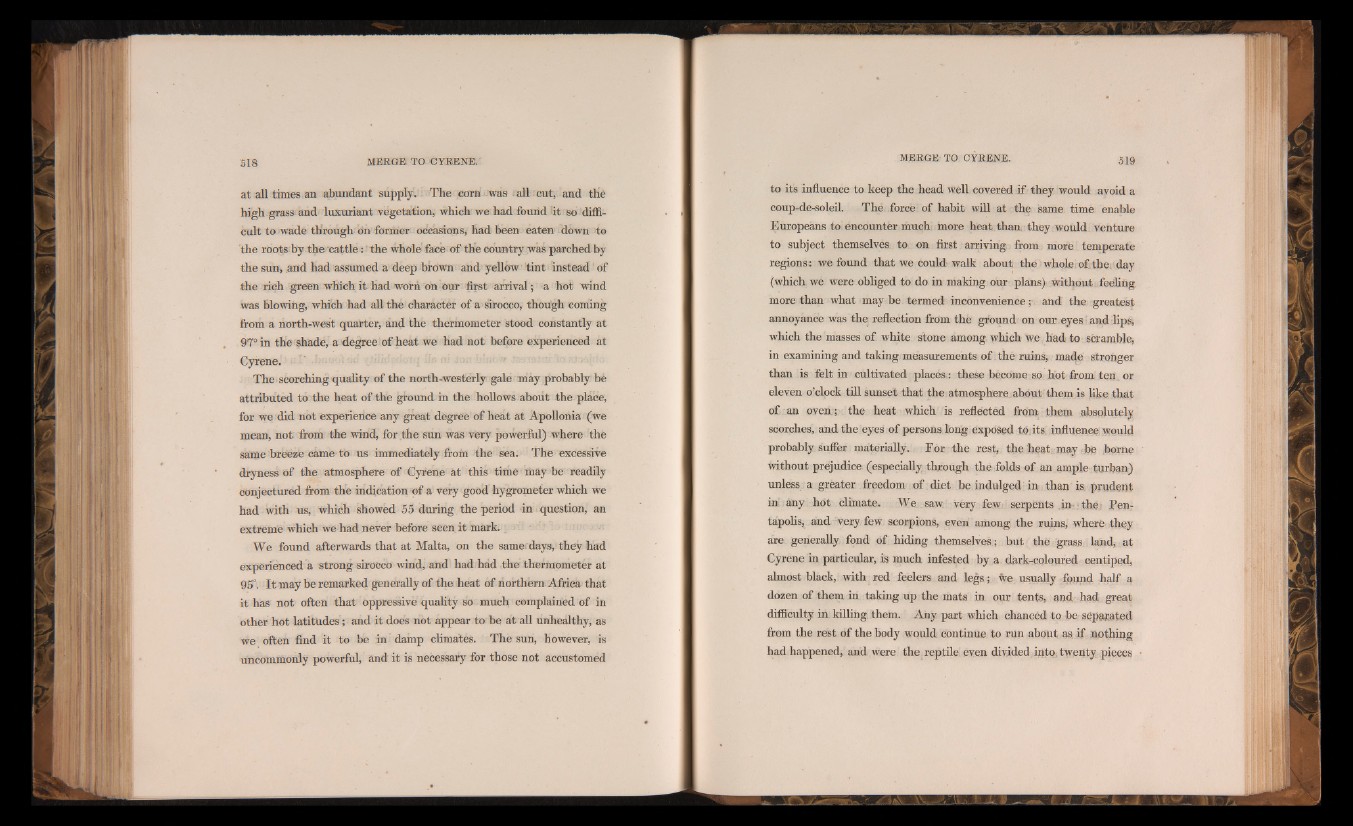
at all times an abundant supply. The corn was all cut, and tlie
high grassland luxuriant vegetation, which we had found it so difficult
to wade through on former odcasioiis, had been eaten down to
the roots by the 'cattle : I the whole face of the coun try was parched by
the sun, and had assumed a deep brown and yellow tint instead ' of
the rich green which it had wofn on Ottr first arrival’; a hot wind
was blowing, which had all the character of a sirocco, though coming
from a north-west quarter, and thè thermometer stood constantly at
9 7° in the shade, a degree of heat we had not before experienced at
Gyrene.
The scorching quality of the north-westerly gale may probably bé
attributed to the heat of the ground in the hollows about the place,
for we did not experience any great degree of heàt at Apollonia (we
mean, not from the wind, for the sun was very powerful) where thè
same breeze came to us immediately from the sea. The excessive
dryness of the atmosphere of Cyrene at this time may be readily
conjectured from thè indication of a very good hygrometer which we
had with us, which showed 55 during the period in question, an
extreme which We had never before seen it mark.
We found afterwards that at Malta, on the same, days, 1 they had
experienced a strong sirocco wind, and had had the thermometér at
95°. I t may be remarked generally of the heat of northern Africa that
it has not often that oppressive quality so much complained of in
other hot latitudes ; and it does not appear to be at all unhealthy, as
we often find it to be in damp climates. The sun, however, is
uncommonly powerful, and it is necessary for those not accustomed
to its influence to keep the head well covered if they would avoid a
coup-de-soleiL The. force of habit will at the same time enable
Europeans to encounter much more heat than, they would venture
to subject themselves, to on first arriving: from more temperate
regions : we found that we could walk about the whole of the. day
(which we were obliged to do in making our plans) without, feeling
more than what may be termed inconvenience; and the greatest
annoyance was the reflection from the ground on our eyes and lips,
which the masses of white stone among which we had to scramble,
in examining and taking measurements o f. thé ruins, made stronger
than is felt in cultivated places.: these become so. hot: from: ten or
eleven o’clock till sunset that the atmosphere about them is like that
of an oven ; the heat which is reflected from them absolutely
scorches, and the eyes of persons long exposed to its. influence would
probably suffer materially. For the rest, the heat may be borne
without prejudice (especially through the folds of an ample turban)
unless a greater, freedom of diet be indulged in than is prudent
in any hot climate. We saw very few. serpents in- the: ften-
tapohs, and very few scorpions, even among the ruins, where, they
are generally fond of hiding themselves ; but the grass land, at
Cyrene in particular, is much infested by a. dark-coloured centiped,
almost black, with red feelers and legs ; we usually found half a
dozen of them in taking up the mats in our tents, and had great
difficulty in killing, them. Any part which chanced to be separated
from the rest of the body would continue to run about as. if nothing
had happened, and were the reptile, even divided into, twenty pieces